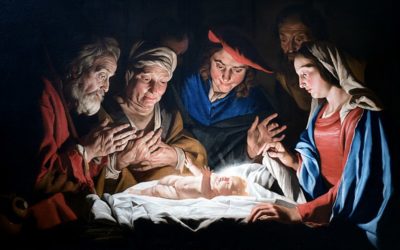The Church was still less than two years old in December 1831 and January 1832 when Joseph Smith received several revelations to guide the Church through the challenges of growth and opposition. During these two months, Joseph turned twenty-six years old. He had been first elder of the Church when it was organized but during this period became President of the High Priesthood, or what today we would call the President of the Church. Today, we are used to Church Presidents whose child-rearing days are long behind them and who have decades of mentoring from senior Church leaders. Joseph at this time was the most senior Church leader and also a young husband and father struggling to balance the demands of family life and Church responsibilities.
Doctrine and Covenants 71
On December 1, 1831, when Joseph received the revelation that is now section 71 of the Doctrine and Covenants, he and Emma were living at the home of John and Elsa Johnson in Hiram, Ohio, some thirty miles south of Kirtland. Starting seven weeks before Joseph received this revelation, apostate Ezra Booth had begun publishing a series of letters against the Church in an Ohio newspaper. Symonds Rider, another apostate, also worked against the Church. Opposition became so strong that the Prophet and his scribe, Sidney Rigdon, had to leave off translating the Bible to respond as this revelation directs.
“Behold,” the revelation began, “thus saith the Lord unto you my servants Joseph Smith, Jun., and Sidney Rigdon, that the time has verily come that it is necessary and expedient in me that you should open your mouths in proclaiming my gospel, the things of the kingdom, expounding the mysteries thereof out of the scriptures, according to that portion of Spirit and power which shall be given unto you, even as I will. Verily I say unto you, proclaim unto the world in the regions round about, and in the church also, for the space of a season, even until it shall be made known unto you.” (Verses 1‒2.)
To Joseph and Sidney, it may have felt distracting to drop their important spiritual work of translation to deal with an antagonist. But the Lord promised the work was for a limited time and that spiritual blessings would follow. “This is a mission for a season,” the Lord said. “Wherefore, labor ye in my vineyard. Call upon the inhabitants of the earth, and bear record, and prepare the way for the commandments and revelations which are to come.” (Verses 3‒4.)
The Lord then taught them an important principle that applies to all of us. “Now, behold this is wisdom; whoso readeth, let him understand and receive also,” the Lord taught. “For unto him that receiveth it shall be given more abundantly, even power.” (Verse 5‒6.) In other words, when we obey the Lord, even if it seems to detract from other important duties, God will increase our power to do our work.
“Wherefore,” the Lord directed Joseph and Sidney, “confound your enemies; call upon them to meet you both in public and in private; and inasmuch as ye are faithful their shame shall be made manifest. Wherefore, let them bring forth their strong reasons against the Lord.” (Verses 7‒8.)
The Lord promised them victory in the end. “Verily, thus saith the Lord unto you—there is no weapon that is formed against you shall prosper; and if any man lift his voice against you he shall be confounded in mine own due time. Wherefore, akeep my commandments; they are true and faithful.” (Verses 9‒11.)
For more on the history of this revelation, click here.
Doctrine and Covenants 72
While battling those who were seeking to tear down the Church, the Prophet had to continue nurturing those who were true to the faith. Three days after receiving the revelation that is now section 71, Joseph Smith received three revelations for members seeking further light and knowledge. Section 72 of the Doctrine and Covenants combines these revelations.
Doctrine and Covenants 72:1–8
Edward Partridge was the first bishop appointed for the Church (Doctrine and Covenants 41:9). In November 1831, the Lord declared, “There remain hereafter, in the due time of the Lord, other bishops to be set apart unto the church, to minister even according to the first” (Doctrine and Covenants 68:14). Now in December 1831, the Lord appointed Newell K. Whitney as the second bishop (Doctrine and Covenants 72:8.).
Bishop Partridge had moved from Kirtland to Missouri and was the bishop who presided there. Bishop Whitney, according to the new revelation, would serve “in this part of the Lord’s vineyard,” meaning Ohio (Doctrine and Covenants 72:2). In turn, the Lord directed, “the elders of the church in this part of my vineyard shall render an account of their stewardship unto the bishop” (verse 5). To keep matters in the Kirtland Stake coordinated with those in the center place of Zion, the accounts of stewardships in Kirtland were to “be had on record, to be handed over unto the bishop in Zion” (verse 6).
Because Bishop Whitney was new, he needed training. In the revelation, the Lord directed, “And the duty of the bishop shall be made known by the commandments which have been given, and the voice of the conference” (verse 7). In other words, the revelations already given contained much instruction to help the bishop, and specific questions could be taken to a conference for consideration of the members.
For further historical background on this revelation, click here.
Doctrine and Covenants 72:9–23
The second revelation that makes up section 72 of the Doctrine and Covenants contains further instructions for the Church’s two bishops at the time and for bishops to follow. The revelation specifies these additional duties:
• “To keep the Lord’s storehouse” (verse 10)
• “To receive the funds of the church in this part of the vineyard” (verse 10)
• “To take an account of the elders” (verse 11), and
• “To administer to their wants” (verse 11).
The bishop’s storehouse was to operate as a general store, and the elders were to “pay for that which they receive, inasmuch as they have wherewith to pay” (verse 11), with the profits being “consecrated to the good of the church, to the poor and needy” (verse 12). If any had “not wherewith to pay, an account shall be taken and handed over to the bishop of Zion, who shall pay the debt out of that which the Lord shall put into his hands” (verse 13).
As the elders gave the bishop in Kirtland an account of their stewardships (verse 16), he would give them a certificate they could present to the bishop of Zion when they eventually gathered there (verse 17). “For according to the law every man that cometh up to Zion must lay all things before the bishop in Zion” (verse 15).
Even though these instructions pertained to Kirtland and Missouri, the Lord specified that “this shall be an ensample for all the extensive branches of my church, in whatsoever land they shall be established” (verse 23).
For further historical information on this revelation, click here.
Doctrine and Covenants 72:24–26
The final revelation that makes up section 72 of the Doctrine and Covenants expands the prior revelation’s directions on certificates. This revelation begins, “A few words in addition to the laws of the kingdom, respecting the members of the church” (verse 24).
The Lord then directs: “They that are appointed by the Holy Spirit to go up unto Zion, and they who are privileged to go up unto Zion—let them carry up unto the bishop a certificate from three elders of the church, or a certificate from the bishop; otherwise he who shall go up unto the land of Zion shall not be accounted as a wise steward.” (Verses 25–26.)
The system of certificates used in the early days of the Church has been replaced in part by membership records and temple recommends.
For further historical information on this revelation, click here.
Doctrine and Covenants 73
The work that Joseph Smith, Sidney Rigdon, and other elders did in combating those opposing the Church began to have an effect, and on January 10, 1832, the Lord gave them further instructions.
The elders of the Church were to “continue preaching the gospel” and spending their time strengthening “the churches in the regions round about,” or what we would call branches, “until conference” (verse 1). When conference time came, it would then “be made known unto them, by the voice of the conference, their several missions” (verse 2).
For Joseph and Sidney, however, it was now “expedient to translate again” (verse 3) as their first duty, and “inasmuch as it is practicable, to preach in the regions round about until conference.” After conference, they were “to continue the work of translation until it be finished” (verse 4).
For further historical information on this revelation, click here.
Doctrine and Covenants 74
The first generation of Church members came out of a culture in which Bible literacy was far beyond what it is today. In the first epistle of Paul to the Corinthians in the New Testament, he addressed what happens in a marriage in which the woman is a believer and her husband is not. “For the unbelieving husband,” Paul wrote, “is sanctified by the wife, and the unbelieving wife is sanctified by the husband: else were your children unclean; but now are they holy” (1 Corinthians 7:14). As the current headnote to section 74 of the Doctrine and Covenants explains, this passage “had often been used to justify infant baptism.”
Sometime between January 1830 and January 1831, the explanation that is now section 74 of the Doctrine and Covenants was recorded, later becoming part of the published body of Joseph Smith’s revelations.
This section of the Doctrine and Covenants explains that when a Christian woman was married to someone who followed the law of Moses but did not believe in Christ, difficulties could arise. Specifically, it notes, the husband might want his children to follow the law of Moses, accepting a culture that was incompatible with Christianity, and thereby leading them out of the Church (verses 1–4). “Wherefore, for this cause the apostle wrote unto the church, giving unto them a commandment, not of the Lord, but of himself, that a believer should not be united to an unbeliever; except the claw of Moses should be done away among them” (verse 5).
By abandoning the old traditions of the law of Moses, they could also do away with “the tradition . . . which saith that little children are unholy,” a tradition that “was had among the Jews” in Paul’s day (verse 6).
To correct any modern misconceptions, sections 74 specifically repeats a principle from the Book of Mormon that “little children are holy, being sanctified through the atonement of Jesus Christ” (verse 7; see also Moroni 8).
Doctrine and Covenants 75
On November 11, 1831, a revelation in Hiram, Ohio, directed “that one be appointed of the High Priesthood to preside over the priesthood, and he shall be called President of the High Priesthood of the Church; or, in other words, the Presiding High Priest over the High Priesthood of the Church” (Doctrine and Covenants 107:65–66.) Two months later on January 25, 1832, a major Church conference was held fifty miles west of Kirtland in Amherst, Ohio, where a branch of the Church had previously been organized.
The conference sustained Joseph Smith, the first elder of the Church, as the new President of the High Priesthood, or what we call the President of the Church today. That same day, Joseph received two revelations that have been combined to form section 75 of the Doctrine and Covenants.
Doctrine and Covenants 75:1–22
In the first of these revelations, now verses 1 through 22, the Lord instructs those who volunteered “to go forth to proclaim my gospel, and to prune my vineyard” (verses 1–2). “Behold,” the Lord tells them, “it is my will that you should go forth and not tarry, neither be idle but labor with your might—lifting up your voices as with the sound of a trump, proclaiming the truth according to the revelations and commandments which I have given you” (verses 3–4). He also promises, “If ye are faithful ye shall be laden with many sheaves, and crowned with honor, and glory, and immortality, and eternal life” (verse 5).
After this general instruction, the Lord gives specific assignments to individuals. He revokes the commission he previously gave William E. McLellin “to go unto the eastern countries” and chastens him “for the murmurings of his heart” (verses 6–7). “He sinned,” the Lord declared, “nevertheless, I forgive him and say unto him again, Go ye into the south countries” (verse 8).
The Lord directed that Luke Johnson go with him as a companion and that they “proclaim the things which I have commanded them—calling on the name of the Lord for the Comforter, which shall teach them all things that are expedient for them—praying always that they faint not; and inasmuch as they do this, I will be with them even unto the end” (verses 9–11).
Instead of sending William McLellin to “the eastern countries,” the Lord sent Orson Hyde, Samuel Smith, Lyman Johnson, and Orson Pratt (verses 13–14). He sent Asa Dodds and Calves Wilson to “the western countries” (verse 15), and Major Ashley and Burr Riggs to “the south country” (verse 17).
“Let all those take their journey,” the Lord commanded, “going from house to house, and from village to village, and from city to city. And in whatsoever house ye enter, and they receive you, leave your blessing upon that house.” (Verses 18–19.) These words sound familiar to modern missionaries as well.
On the other hand, the Lord directed, “in whatsoever house ye enter, and they receive you not, ye shall depart speedily from that house, and shake off the dust of your feet as a testimony against them.” Despite being rejected, the Lord promised, “you shall be filled with joy and gladness,” and those who refused to receive the word would have to answer “in the day of judgment.” (Verses 20-22.)
These missionaries, therefore, were told to “gird up your loins and be faithful, and ye shall overcome all things, and be lifted up at the last day” (verse 22).
For more on the historical background of this revelation, click here.
Doctrine and Covenants 75:23–36
The second revelation received at the Amherst conference responded to a request from elders who wanted to know the Lord’s will concerning them (verse 23). They were directed “to support the families of those who are called . . . to proclaim the gospel unto the world” (verses 24–26). If those called to go out ended up providing for their own families, they would be blessed for serving too (verse 28).
“Let every man be diligent in all things,” the Lord commanded. And the idler shall not have place in the church, except he repent and mend his ways.” (Verse 29.) In the remainder of the revelation, the Lord called fourteen men by name to “be united in the ministry” (verses 30–36).
For more on the historical background of this section, click here.
Photo credit for image at top of page: Stock photo from depositphotos.com.



